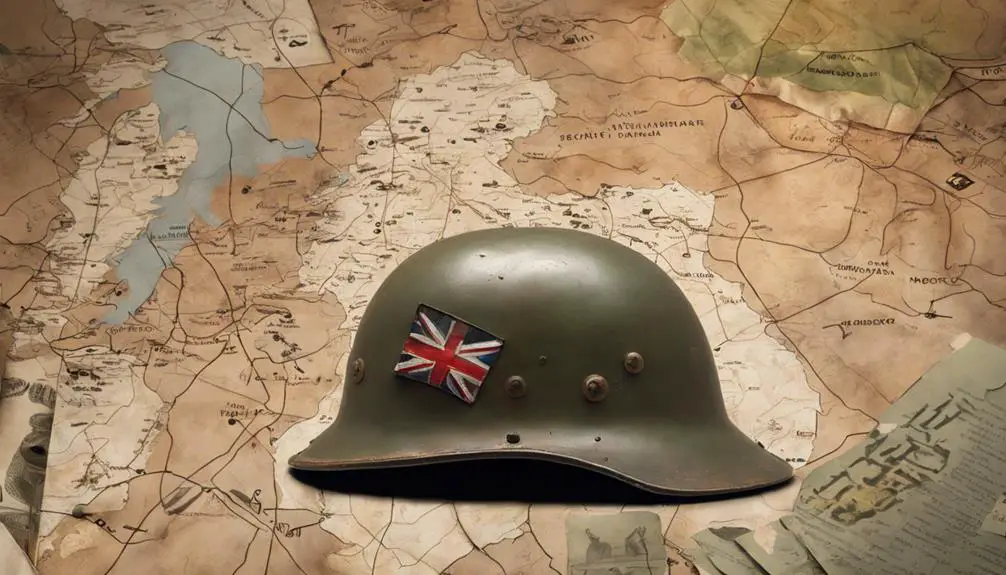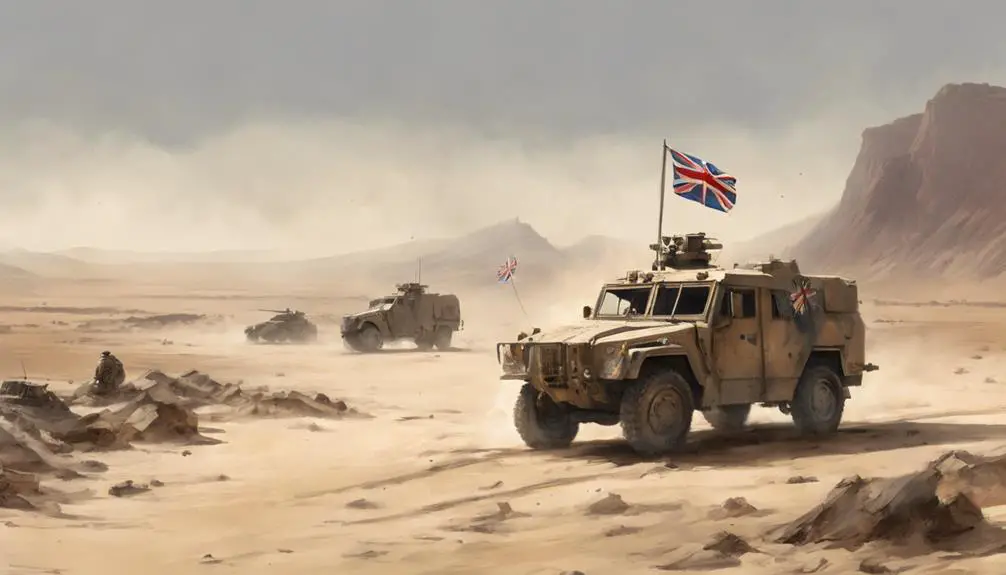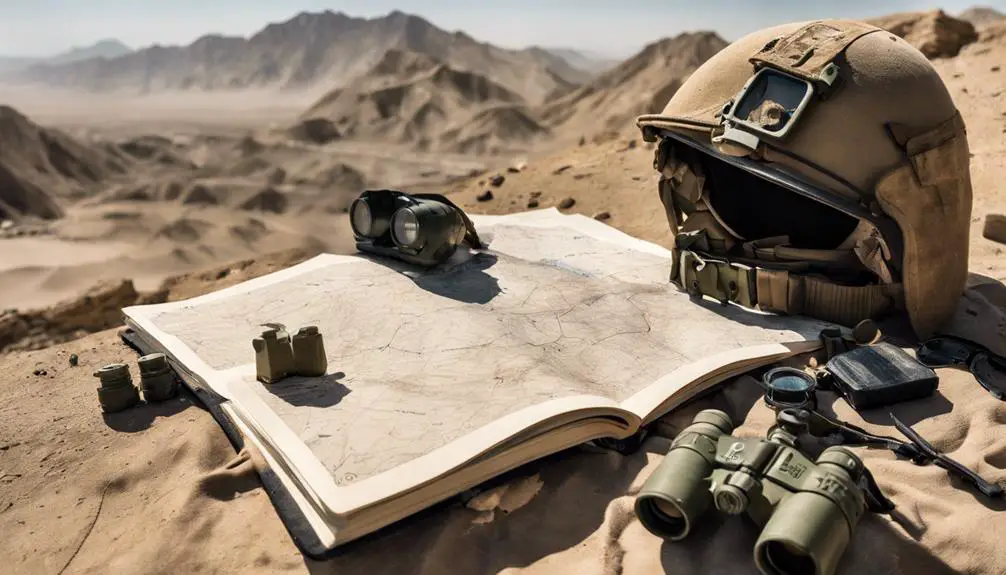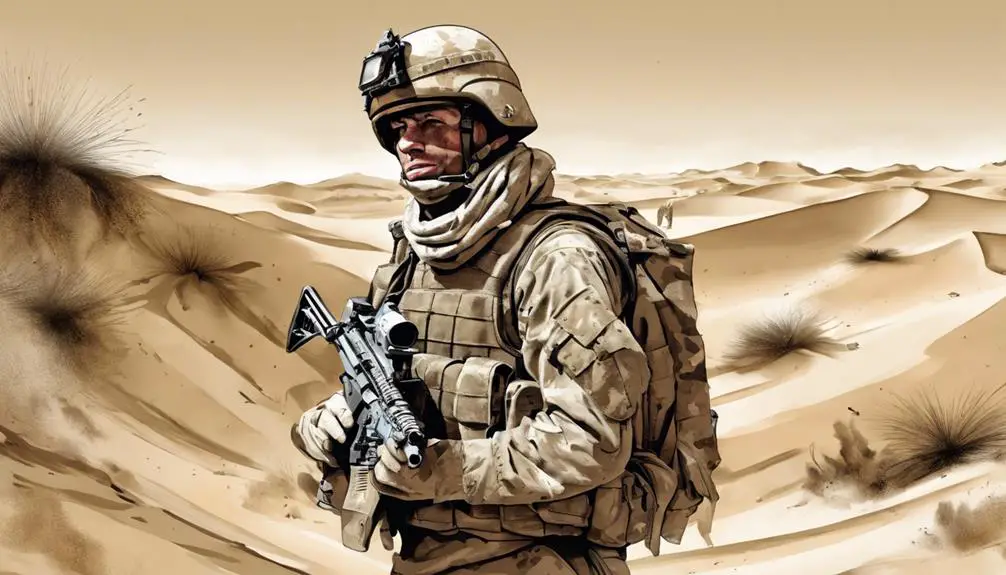You've entered the world of British Military Slang in Afghanistan, where Dushka, ANA, and Sangar are more than just words – they're a dialect born from the harsh realities of combat and the need for swift, efficient communication. This unique slang emerged as a response to the challenges of the Afghan theatre, shaped by the need for secrecy, brevity, and camaraderie. You'll encounter war cries like 'Oscar Mike' and 'Bravo Zulu', tactical acronyms like SOP and FOB, and patrol lingo that enables swift communication of critical information. As you explore this world, you'll uncover the complexities of military life in Afghanistan, where slang is more than just a language – it's a way of life.
Origins of Military Slang

Emerging from the trenches of World War I, military slang in the British Army was initially shaped by the need for secrecy and brevity in communication. As you explore the world of military slang, you'll discover that it's not just a quirky way of speaking – it's a language born out of necessity.
The Linguistic Evolution of military slang is a fascinating story that reveals the Historical Roots of this unique dialect.
During World War I, soldiers relied on coded language to convey essential information without alerting the enemy. This need for secrecy led to the creation of slang terms that were both cryptic and concise. As the war progressed, these terms became an integral part of military communication, allowing soldiers to convey complex ideas quickly and efficiently.
The Historical Roots of military slang are deeply rooted in this period, where the need for brevity and secrecy gave birth to a unique dialect that has continued to evolve over time.
As you investigate the world of military slang, you'll uncover a rich history that's both fascinating and informative.
Afghan Theatre Lingo
Deployed in the harsh terrain of Afghanistan, you're likely to encounter a unique dialect of military slang that's adapted to the region's distinct challenges and cultural nuances. This Desert dialect has evolved to reflect the realities of combat in this unforgiving environment.
As you navigate the complexities of warfare, you'll pick up on the colloquialisms and phrases that have become an integral part of the Afghan theatre lingo.
Here are a few examples of the unique slang you'll encounter:
- Dushka: a Russian-made machine gun commonly used by the Taliban.
- ANA: the Afghan National Army, which often works alongside British forces.
- Sangar: a fortified sentry post, often used to provide security in remote areas.
This warrior wisdom is passed down through the ranks, with veterans sharing their knowledge and experience with newer recruits. As you become more familiar with the Afghan theatre lingo, you'll gain a deeper understanding of the cultural context in which you're operating.
This Desert dialect is more than just a collection of slang terms – it's a reflection of the camaraderie and shared experiences that define military life in Afghanistan.
Combat Zone Colloquialisms

As you navigate the complexities of combat in Afghanistan, you'll quickly pick up on the colloquialisms and phrases that have become an integral part of the combat zone lingo. In the heat of battle, clear communication is essential, and that's where combat zone colloquialisms come in. You'll hear War Cries, like 'Oscar Mike' (on the move) or 'Bravo Zulu' (well done), to convey quick messages.
Radio Chatter, an important aspect of combat communication, relies on these colloquialisms to guarantee swift and accurate transmission of information. In the thick of combat, every second counts, and using colloquialisms helps to reduce confusion and miscommunication. You'll hear phrases like 'Wait One' (wait a minute) or 'Say Again' (repeat that) to clarify orders or instructions.
These colloquialisms have become an essential part of the combat zone's linguistic landscape, allowing troops to communicate quickly and effectively in high-pressure situations. As you operate in the combat zone, understanding these colloquialisms will become second nature, allowing you to focus on the mission at hand.
Tactical Acronyms Decoded
You'll encounter a range of tactical acronyms in the British Military's Afghanistan operations, from 'SITREP' (situation report) to 'COMMS' (communications), and understanding these abbreviations is essential for effective communication in the field. As a Code Breaker, you'll need to decipher these cryptic codes to stay ahead in the game.
Here are three essential tactical acronyms to get you started:
- SOP (Standard Operating Procedure): outlines the protocols for various military operations, ensuring consistency and efficiency.
- FOB (Forward Operating Base): a temporary or permanent military base used to support operations in the field.
- RTO (Radio Telephone Operator): the soldier responsible for maintaining communication equipment and facilitating radio transmissions.
Mastering these tactical acronyms will make you a Slang Buster, able to navigate the complex world of military communication with ease. By cracking the code, you'll be better equipped to work with your team and achieve mission objectives. Remember, in the heat of battle, clear communication is key to success.
Slang in the Field

In the high-pressure environment of Afghanistan, soldiers rely on informal slang to quickly convey complex ideas and emotions, fostering a sense of camaraderie and shared experience. You'll often hear Camp Banter, a lighthearted way to poke fun at each other, helping to diffuse tension and boost morale. This casual, humorous language helps create a sense of belonging and unity among troops.
When you're out on patrol, Patrol Lingo takes over. This specialized vocabulary enables soldiers to quickly communicate critical information, ensuring swift and effective decision-making in high-stress situations. You might hear phrases like 'Oscar Mike' (on the move) or 'Sit Rep' (situation report), allowing teams to rapidly convey and respond to changing circumstances.
In the field, slang is more than just a casual convenience – it's an essential tool for effective communication. By using shared, informal language, soldiers can quickly convey complex ideas, emotions, and instructions, ensuring they stay focused on the mission at hand.
As you navigate the challenges of Afghanistan, you'll find that slang is an integral part of military life, facilitating teamwork, camaraderie, and success.
Cultural Significance of Slang
British military slang in Afghanistan reflects and reinforces the cultural norms and values of the military community, providing a shared identity and sense of belonging among troops.
As you explore the world of British military slang, you'll discover that it's more than just a collection of colloquialisms – it's a cultural code that defines the military's unique identity.
Here are three ways British military slang shapes cultural significance:
- Slang as Identity: British military slang creates a sense of exclusivity, distinguishing troops from civilians and fostering a sense of camaraderie among soldiers. It's a badge of honor, signifying you're part of an elite group.
- Cultural Code: Slang serves as a shared language, conveying complex ideas and emotions in a concise manner. It's a cultural shorthand that facilitates communication and reinforces shared values.
- Social Bonding: British military slang encourages social bonding, as troops use colloquialisms to build relationships and establish trust. It's a way to connect with others who share similar experiences and values.
Frequently Asked Questions
Is Military Slang Used Only in Afghanistan or Globally?
You might wonder if military slang is unique to a specific region or has a global reach. The answer lies in its adaptability.
While some terms are born from a regional twist, others spread globally, transcending borders. Military slang often blends local flavor with universal appeal, making it a fascinating blend of cultural exchange and global communication.
As you explore military slang, you'll discover its global reach, with regional twists that reflect the diverse experiences of those who serve.
Can Civilians Use Military Slang in Casual Conversations?
You're wondering if you can casually drop military slang in conversation as a civilian. Well, it's a gray area.
While it's not illegal, using military slang without a direct connection to the military can be seen as cultural appropriation. Social acceptance varies, but using these terms without context or understanding can come across as insensitive or pretentious.
Be mindful of your audience and the origins of the slang to avoid unintended offense.
Are There Any Official Guidelines for Military Slang Usage?
You're wondering if there are official guidelines for military slang usage. The answer is, it's a gray area. While formal regimens don't explicitly dictate slang usage, debates around standardization persist.
Military organizations often tolerate slang as a cultural aspect, but there's no one-size-fits-all approach. You'll find varying degrees of acceptance depending on the unit, branch, or operation.
It's a delicate balance between fostering camaraderie and maintaining professionalism.
Do All Military Branches Use the Same Slang Terms?
As you navigate the linguistic landscape of the military, it's like trying to find your way through a dense forest – you need a map to avoid getting lost in the weeds.
When it comes to slang, you'll find that each branch has its own dialect. You'll discover slang variations between the Army, Navy, Air Force, and Marines. While some terms might overlap, branch differences are prominent.
For instance, the Army's 'Hooah' (meaning 'yes' or 'agreement') differs from the Navy's 'Aye aye' (meaning 'yes, sir').
Is Military Slang Only Used for Communication or Also for Bonding?
You might think military slang is just for quick communication, but it's more than that. It's a camaraderie builder, fostering unit cohesion among troops.
When you use slang, you're signaling you're part of the group, creating a sense of belonging. It's a way to connect with fellow soldiers, transcending ranks and roles.
Slang becomes a shared language, strengthening bonds and trust within the unit.
Conclusion
You've been dropped into the midst of a linguistic battlefield, where British military slang in Afghanistan is the terrain. As you navigate this cultural landscape, you've uncovered the origins of military slang, decoded tactical acronyms, and witnessed slang in the field.
Like a well-oiled machine, military slang lubricates communication, facilitating swift decision-making in high-pressure situations. It's the glue that holds the team together, a verbal shorthand that saves lives.







